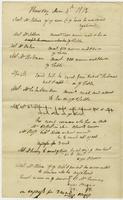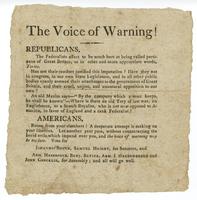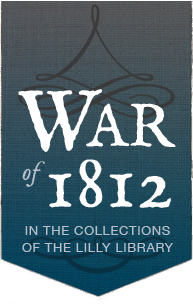War Hawks
Though the War of 1812 was dubbed “Mr. Madison’s War,” his role in the prosecution of the war was relatively ineffectual. Elected in 1808, President James Madison was intimately familiar with the ongoing diplomatic and trade conflicts with Britain. As Secretary of State under President Jefferson, he was the principal architect of the “restrictive system” of trade embargos designed to force Britain to relax its control of Atlantic trade. Madison’s support of this failed system lasted well into the war itself.
Madison’s attempts to resolve disagreements with Britain peacefully was viewed by some in his own Republican party as a sign of weakness. A group of pro-war Republicans, led by Speaker of the House Henry Clay, argued that military force was the only option left to combat British imperiousness. These “War Hawks” were not a majority of the party, but over time, their influence acted on more skeptical party members.
President Madison eventually did bring a declaration of war to Congress, but his leadership in planning for war was mostly absent. Republican ideology was intensely skeptical of the concept of a national standing army, preferring to rely on state militias, and the Madison administration, following in the footsteps of Jefferson, did much to starve national military forces of men and material support. His influence on Congress was minimal, and in retrospect, it is hard to understand how he, or the War Hawks for that matter, felt that the United States had the necessary military resources to prosecute a war on multiple fronts.
Related Items
![Report, or manifesto of the causes and reasons of war with Great Britain : presented to the House of Representatives by the Committee of [sic] Foreign Relations. Report, or manifesto of the causes and reasons of war with Great Britain : presented to the House of Representatives by the Committee of [sic] Foreign Relations.](https://collections.libraries.indiana.edu/warof1812/files/thumbnails/b57c6f6d68620b9a2f276ec4970c0bac.jpg)
The case for war
Report, or manifesto of the causes and reasons of war with Great Britain : presented to the House of Representatives by the Committee of Foreign Relations. Washington : A. & G. Way, Printers, 1812.
Issued by the House Committee on Foreign Relations, this 17 page report is a succint summary of the argument for war. It outlines disputes regarding trade and impressment and makes free use of patriotic language. Its concluding paragraph reads, in part: "Your committee, believing that the free born sons of America are worthy to enjoy the liberty which their fathers purchased at the price of so much blood and treasure, and seeing in the measures adopted by Great Britian, a course commenced and persisted in, which must lead to a loss of national character and independence, feel no hesitation in advising resistance by force..."
John Calhoun, a leading "war hawk" and U.S. representative from South Carolina, was acting chairman of the Committee on Foreign Relations when it issued this report. He later served as Secretary of War under President Monroe, using his position to push reform of the military which had been badly mismanaged during the war. He remained a major political figure for the rest of his life, including serving as Vice President to both John Quincy Adams and Andrew Jackson.

A secret session of Congress
United States. Congress (12th, 1st session : 1811-1812). House. Secret Minutes. June 4, 1812.
The U.S. Congress met in secret session on June 4, 1812, to discuss a declaration of war. These secret minutes of the meeting record a number of votes, including one on the motion of John Randolph to postpone the bill until "the 1st Monday of October next" (p. 4). It was defeated "Ayes 42, Noes 81."

Vote against the "Tories"
The voice of warning! New York, 1810.
This election broadside accuses anti-war Federalists of "attachment to the government of Great Britain, and their cruel, unjust, and unnatural opposition to our own."



